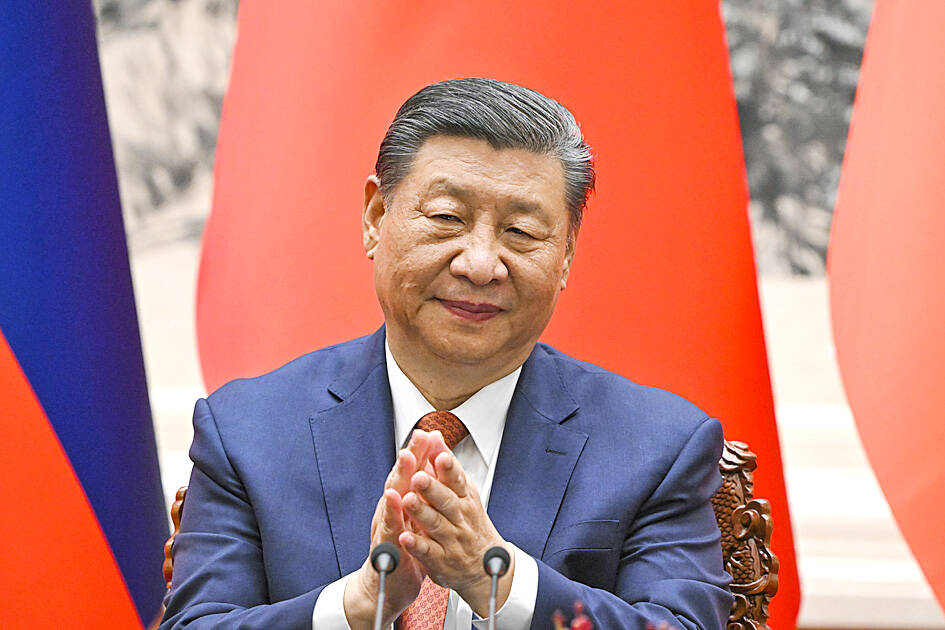China’s latest artificial intelligence (AI) chatbot is trained on Chinese President Xi Jinping’s (習近平) doctrine, in a stark reminder of the ideological parameters that Chinese AI models should abide by.
China’s cyberspace academy earlier this week announced the chatbot trained on “Xi Jinping Thought,” a doctrine that promotes “socialism with Chinese characteristics.”
The chatbot was trained on seven databases, six of which were mostly related to information technologies provided by China’s Internet watchdog, the Cyberspace Administration of China, or CAC.

Photo: AP
Xi Jinping Thought was the seventh database that the chatbot was trained on, according to a WeChat messaging service post by CAC’s magazine about the AI model.
The Xi-trained large-language model is the latest effort by authorities to spread the Chinese leader’s ideology and ideas. Students have had to take classes on Xi Jinping Thought in schools, and an app called Study Xi Strong Nation was rolled out in 2019 to allow users to learn and take quizzes about his ideologies.
Xi Jinping Thought — also known as “Xi Jinping Thought on Socialism with Chinese Characteristics for a New Era” — is made up of 14 principles, including ensuring the absolute power of the Chinese Communist Party, strengthening national security and socialist values, as well as improving people’s livelihoods and well-being.
The chatbot was created primarily to demonstrate the development and practical applications in cybersecurity and IT research, said the China Institute of Cybersecurity Affairs, which had launched the AI model for internal use.
The AI model would be able to generate report outlines on topics such as AI development and productivity, the CAC magazine’s WeChat post said.
“Users can choose different categories of knowledge bases for intelligent question and answer. The professionalism and authority of the corpus ensure the professionalism of the generated content,” the post said.
The AI model would also be able to create reports, summarize information and provide translations in Chinese or English for users who have access to it.
However, it is not clear if the Xi-trained chatbot is meant for public use.
The unveiling of the chatbot comes as the US and China are locked in a race for AI supremacy.
Although San Francisco-based OpenAI’s generative AI model ChatGPT has been widely credited as one of the most important developments in the field, China also has ambitions to become the global leader in AI by 2030.
Technology firms such as Alibaba and Baidu have already rolled out primarily Chinese-language AI models similar to ChatGPT for public and commercial use.
However, these AI models tend to be more restricted as they have to abide by China’s strict censorship rules. Chinese AI models often do not answer any politically sensitive questions posed to them.

Kehinde Sanni spends his days smoothing out dents and repainting scratched bumpers in a modest autobody shop in Lagos. He has never left Nigeria, yet he speaks glowingly of Burkina Faso military leader Ibrahim Traore. “Nigeria needs someone like Ibrahim Traore of Burkina Faso. He is doing well for his country,” Sanni said. His admiration is shaped by a steady stream of viral videos, memes and social media posts — many misleading or outright false — portraying Traore as a fearless reformer who defied Western powers and reclaimed his country’s dignity. The Burkinabe strongman swept into power following a coup in September 2022

TRUMP EFFECT: The win capped one of the most dramatic turnarounds in Canadian political history after the Conservatives had led the Liberals by more than 20 points Canadian Prime Minister Mark Carney yesterday pledged to win US President Donald Trump’s trade war after winning Canada’s election and leading his Liberal Party to another term in power. Following a campaign dominated by Trump’s tariffs and annexation threats, Carney promised to chart “a new path forward” in a world “fundamentally changed” by a US that is newly hostile to free trade. “We are over the shock of the American betrayal, but we should never forget the lessons,” said Carney, who led the central banks of Canada and the UK before entering politics earlier this year. “We will win this trade war and

‘FRAGMENTING’: British politics have for a long time been dominated by the Labor Party and the Tories, but polls suggest that Reform now poses a significant challenge Hard-right upstarts Reform UK snatched a parliamentary seat from British Prime Minister Keir Starmer’s Labor Party yesterday in local elections that dealt a blow to the UK’s two establishment parties. Reform, led by anti-immigrant firebrand Nigel Farage, won the by-election in Runcorn and Helsby in northwest England by just six votes, as it picked up gains in other localities, including one mayoralty. The group’s strong showing continues momentum it built up at last year’s general election and appears to confirm a trend that the UK is entering an era of multi-party politics. “For the movement, for the party it’s a very, very big

SUPPORT: The Australian prime minister promised to back Kyiv against Russia’s invasion, saying: ‘That’s my government’s position. It was yesterday. It still is’ Left-leaning Australian Prime Minister Anthony Albanese yesterday basked in his landslide election win, promising a “disciplined, orderly” government to confront cost-of-living pain and tariff turmoil. People clapped as the 62-year-old and his fiancee, Jodie Haydon, who visited his old inner Sydney haunt, Cafe Italia, surrounded by a crowd of jostling photographers and journalists. Albanese’s Labor Party is on course to win at least 83 seats in the 150-member parliament, partial results showed. Opposition leader Peter Dutton’s conservative Liberal-National coalition had just 38 seats, and other parties 12. Another 17 seats were still in doubt. “We will be a disciplined, orderly